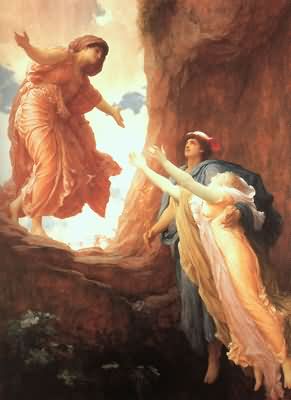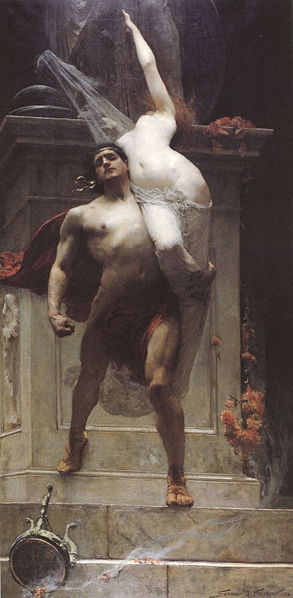Rape is all over Greek myths. It’s impossible to read for more than a day and not stumble across it. D’Aulaires usually talked about men abducting women, kidnapping women, or dragging women away by the hair (in the case of Centaurs) or in less violent instances of rape they evaded the issue entirely (for example the rape of Alcmene by Zeus resulting in the birth of Heracles is glossed as something like “Alcmene was his moms and Zeus was his pops, so Hera was super pissed”). And maybe, for the most part, it’s best that way. Because rape is a tough thing to talk about. And it’s even tougher to talk about in the context of Ancient Greece.
There’s lots of different ways rape shows up in Greek myths. Sometimes rape looks exactly like what jumps first to mind today: a violent man and a woman clearly saying no. Like during the sack of Troy at the end of the Trojan War, when Aias chases Cassandra into the temple where she clings to the statue of Athena (the Virgin Goddess) and brutally rapes her there. Or, you know, the rape of Caenis which was bad enough that she asked to be turned into an impenetrable man. A rape of a man by a woman also falls into this category: the rape of Hermaphroditus by Salmacis.
Sometimes rape is about people having sex with the wrong people, and there’s a depressing number of stories about incestuous rape, though a few of them have what you might call happy endings (like Gorgo and maybe Larissa).
Sometimes, rape doesn’t emphasize violent sex, but is more about stealing someone away, especially a girl away from their family. Like the Rape of Europa by Zeus as a bull, or the Rape of Persephone by Hades (both of whom were picking flowers in a meadow and wandered away from their girlfriends, incidentally).
 Sometimes you think rape might be enjoyable, like when Zeus comes to Danae as a golden shower, or to Alcmene in the form of her husband, or to Callisto in the form of one of her girl-friends.
Sometimes you think rape might be enjoyable, like when Zeus comes to Danae as a golden shower, or to Alcmene in the form of her husband, or to Callisto in the form of one of her girl-friends.
Sometimes in the stories, we don’t even know if we should use the word rape, because it seems like maybe the women are consenting (like Rhoeo, but also a lot of other stories that often get characterized as “seductions” when they’re translated).
That’s because, for the ancient Greeks, rape was more than violence against another person, it was a way of destroying their honor. And for young women – maidens – not being virgins anymore often meant that they were no longer children with good prospects of growing up to be married ladies. I think that the Rape of Persephone is a really useful example of this. Think about it, part of being raped (in this INCREDIBLY important myth) is being taken to the underworld. And when girls died without having had sex yet, people said that they were “married to Death.”
But I am getting ahead of myself. By taking away the oh-so-important virginity of young women, a rapist also took away her worth – including her worth to her family. And that’s why at some points in ancient Greek history, the punishment for rape emphasized the following two options: 1) the rapist could MARRY the girl he raped, thus resolving the honor issue AND giving the girl’s father his due, or 2) the rapist could pay a fine to the father of the girl (or boy), or the husband of the woman if she was married. Sometimes “he raped me” might have been a convenient way for two young people in love to get their parents’ consent to be married.
But, does that mean rape wasn’t really rape? No. Obviously, even though the ancient Greeks didn’t define rape as the lack of consent to sex (at least partly because good, noble women could never possibly consent to sex outside of marriage, and rape was impossible – for them – within marriage), a woman saying no (or at the very minimum, refusing to say yes) was a really important part of these stories.
 And these stories MATTERED to the ancient Greeks. There’s a reason they pop up everywhere. I think that part of that is because sex was really complicated for women in ancient Greece. As a young woman, you weren’t suppose to want sex, but you were definitely supposed to want to get married and have babies – two events centered around the having of sex. I’m pretty sure there’s more to it, but that’s about as far as I can explain.
And these stories MATTERED to the ancient Greeks. There’s a reason they pop up everywhere. I think that part of that is because sex was really complicated for women in ancient Greece. As a young woman, you weren’t suppose to want sex, but you were definitely supposed to want to get married and have babies – two events centered around the having of sex. I’m pretty sure there’s more to it, but that’s about as far as I can explain.
One more parting thing, tho, to shake you up a little. In her book Goddesses, Whores, Wives, and Slaves: Women in Classical Antiquity, Sarah Pomeroy has this to say about rape:
But the erotic fantasies of modern women give us another perspective from which to view the rape myths. … We will never know whether Greek women dreamed of being Leda enfolded in the soft, warm caress of Zeus, or flattered themselves that they were as desirable as Europa, who was carried off by a most intriguing Zeus – masquerading as a bull. Perhaps they alleviated their anxieties by fantasizing that, like Danae, they avoided suffering penetration and were impregnated by a golden shower; or perhaps they freed themselves from the guilt attendant on an adultery fantasy by imagining that they were Alcmene, and innocently accepted Zeus as a lover because the king of the gods had disguised himself as their husband.

Leave a Reply